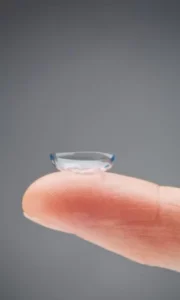If you’re considering mono-focal lenses for your cataract surgery, you’re about to make a decision that could change the way you see the world! In this blog, we’ll dive deep into the world of monofocal lenses, unraveling their benefits, cost, and why they might be the perfect choice for you. Discover why nearly 90% of cataract patients prefer monofocal lenses, and how once implanted, you can be carefree about your vision for life.
From understanding how they enhance your distant vision to their affordability factor, by the end of this read, you’ll be well informed to make the right choice for your eyes. So, sit back and let’s embark on this enlightening journey together!
Contents
Understanding Cataract and Lens Replacement
 Cataracts are a common eye condition where the natural lens inside the eye becomes cloudy, affecting clear vision. Typically brought on by age, but sometimes due to other factors like trauma or certain medications, cataracts can significantly hinder daily activities.
Cataracts are a common eye condition where the natural lens inside the eye becomes cloudy, affecting clear vision. Typically brought on by age, but sometimes due to other factors like trauma or certain medications, cataracts can significantly hinder daily activities.
Now, here’s the silver lining: Treating cataracts is achievable with surgery, which involves removing the cloudy lens and replacing it with an artificial one. This replacement lens becomes the game-changer, restoring clear vision. And that’s where monofocal lenses come into play, standing out as a favored choice for many. Stick around as we delve deeper into the world of these lenses and explore their benefits.
Monofocal Lenses: Basics and Benefits
When it comes to cataract surgery, the type of lens you choose plays a pivotal role in defining your post-surgical vision. Enter the monofocal lens – a popular choice that’s been making waves in the eye care community.
What is a Monofocal Lens
A mono-focal lens is designed to provide clear vision at a single specified distance – usually for far-off objects. This means after your surgery, you’ll see distant objects with striking clarity. Things like road signs, distant landscapes, and people will appear sharp and defined.
Primary Benefits of Monofocal Lenses
- Clear Distance Vision: Monofocal lenses prioritize and perfect one’s distance vision. This ensures that you can drive, watch TV, or gaze at the horizon with impeccable clarity.
- Economical Choice: One of the reasons for their wide acceptance is their cost-effectiveness. They offer a reliable solution without being heavy on the pocket.
- Permanent Solution: Once these lenses are implanted, they stay for good. No worries about further cataract development or needing another lens replacement. It’s a one-time affair that offers lifelong clarity.
- Reduced Dependency on Glasses: Though you might still need reading glasses for close-up tasks, many day-to-day activities become glass-free, giving you a sense of visual freedom.
In essence, monofocal lenses simplify life post-cataract surgery. They offer a reliable, straightforward solution that focuses on delivering clear vision where you need it the most. If you’re leaning towards a hassle-free, budget-friendly lens option that stands the test of time, monofocal lenses could be your ideal pick.
Which Monofocal Lens is Best: Top Cataract Lens Brands
 When it comes to cataract surgery, choosing the right monofocal lens is crucial for optimal vision restoration. Here’s a list of some of the top cataract lens brands known for their quality and performance:
When it comes to cataract surgery, choosing the right monofocal lens is crucial for optimal vision restoration. Here’s a list of some of the top cataract lens brands known for their quality and performance:
- Alcon AcrySof® IQ Monofocal IOL:
- Features: Offers excellent visual clarity and is designed to reduce spherical aberrations.
- Popularity: Widely used and trusted by ophthalmologists worldwide.
- Bausch + Lomb enVista® IOL:
- Durability: Known for its resistance to scratches and damages.
- Clarity: Provides clear vision while minimizing glare and halos.
- Johnson & Johnson TECNIS® Monofocal IOL:
- Technology: Designed to provide high-quality vision under various lighting conditions.
- Versatility: Suitable for a wide range of patients with different visual needs.
- Zeiss CT Asphina® Monofocal IOL:
- Precision: Offers sharp, crisp vision with advanced aspheric design.
- Comfort: Known for its excellent patient outcomes in terms of comfort and visual satisfaction.
- HOYA iSert® Monofocal IOL:
- Biocompatibility: Made with biocompatible materials for better eye acceptance.
- Innovative Design: Features a unique design for easy insertion and stable placement.
- Rayner C-flex® Monofocal IOL:
- Material: Manufactured with a unique material that ensures stability and clarity.
- Design: Offers a comfortable post-surgery experience with its advanced design.
- Staar Surgical Afinity™ Monofocal IOL:
- Quality: Known for high-quality materials and consistent performance.
- Patient Satisfaction: Delivers good visual outcomes and high patient satisfaction rates.
Each of these brands offers unique advantages, and the best choice often depends on individual patient needs and the surgeon’s recommendation.
Comparing Monofocal Lenses with Other IOL Types
 With various lens types available, it’s essential to understand how monofocal lenses stand out from the rest for successful cataract surgery.
With various lens types available, it’s essential to understand how monofocal lenses stand out from the rest for successful cataract surgery.
- Monofocal Lenses:
- Primary Advantage: Singular focus, typically on distance vision.
- Usability: Perfect for activities like driving, watching movies, and outdoor events.
- Price Point: Generally more affordable than most advanced IOLs.
- Limitation: May still require reading glasses for near tasks.
- Multifocal Lenses:
- Primary Advantage: Provide vision at multiple distances – near, intermediate, and far.
- Usability: Versatile for a range of activities without the constant need for glasses.
- Price Point: Typically higher due to the multifunctional design.
- Limitation: Some patients report issues like glare and halos, especially at night.
- Toric Lenses:
- Primary Advantage: Specifically designed to correct astigmatism along with cataracts.
- Usability: Ideal for those with both cataracts and significant astigmatism.
- Price Point: Tends to be higher than monofocal lenses.
- Limitation: Only corrects astigmatism; may still need glasses for reading.
- Accommodating Lenses:
- Primary Advantage: Adjusts within the eye to allow focus at multiple distances.
- Usability: Offers a more natural range of vision compared to standard IOLs.
- Price Point: On the pricier side due to the advanced technology.
- Limitation: Not as versatile as multifocal lenses in providing a range of clear vision.
In conclusion, while each lens type has its unique selling points, mono-focal lenses bring a blend of simplicity, affordability, and reliability. For those looking for a fuss-free solution primarily focused on distance vision, mono-focal lenses are a tried-and-true choice.
Monofocal vs Multifocal Lenses: Which Is Better?
When considering cataract surgery, one of the critical decisions is choosing between monofocal and multifocal lenses. Each type has its own set of advantages and limitations. So, here’s a comparison to help you decide which lens might be better for your needs:
| Aspect | Monofocal Lenses | Multifocal Lenses |
| Price | Generally less expensive. | Typically more expensive due to advanced technology. |
| Visual Outcomes | Excellent for one fixed distance, usually far vision. | Provide clear vision at multiple distances (near, intermediate, far). |
| Need for Eyeglasses | Often needed for near tasks or reading. | Reduced dependence on eyeglasses for most activities. |
| Suitability | Ideal for those with a straightforward visual profile. | Best for those seeking a wider range of vision without glasses. |
| Night Vision | Fewer issues with glare and halos at night. | Some users may experience glare and halos, especially at night. |
| Adjustment Period | Shorter adjustment period. | Longer adjustment period; brain needs time to adapt to new vision. |
| Lifestyle Considerations | Suitable for those with a lifestyle that involves long-distance vision. | More suitable for active lifestyles requiring multi-distance vision. |
| Post-Surgery Satisfaction | High, especially for patients with specific distance requirements. | Generally high, but depends on patient’s adaptability to lens. |
| Customization | Limited customization options. | More options for customization to suit various vision needs. |
In summary, monofocal lenses are a cost-effective and reliable option for those who don’t mind wearing glasses for certain activities. In contrast, multifocal lenses are an advanced option for those seeking greater independence from glasses with a broader range of vision, albeit at a higher cost and with potential for night vision disturbances.
Cost Of Monofocal Lenses For Cataract
Making a health-related decision often requires balancing quality care with affordability. When it comes to choosing an intraocular lens (IOL) for cataract surgery, this is no different. Among the options available, monofocal lenses have carved a niche for themselves, not just because of their simplicity but also due to their cost-effectiveness.
Understanding the Pricing Dynamics:
- Standard Monofocal Lenses: These are the most basic type, primarily correcting distance vision. Their price can range from ₹10,000 to ₹40,000, depending on the brand and quality.
- Premium Monofocal Lenses: Slightly more advanced than standard monofocal lenses, these might offer features like UV or blue light protection. Their pricing can be slightly higher due to these added benefits.
It’s essential to remember that while the initial investment might seem like a substantial amount, the benefits it brings over time make it worthwhile. The clear vision that a monofocal lens provides can enhance everyday life quality, from driving safely to enjoying nature and participating in outdoor activities without hindrance.
Conclusion
Equipped with this comprehensive guide on monofocal lenses, you stand at the threshold of making a well-informed choice for your vision. The clarity and simplicity of monofocal lenses are hard to overlook, especially when balanced with their affordability.
Taking the first step might seem daunting, but with knowledge comes empowerment. And now, you’re more empowered than ever.
Ready to embrace a life of vivid sights and experiences? If you’re grappling with cataract-related challenges, Cataract Surgery at EyeMantra promises a transformative solution. Book your free appointment now at +91 9711116605 and embark on your journey towards impeccable vision.




